Published Jun 7, 2020
O Captain, My Captain: On the Importance of Ben Sisko
We're celebrating the anniversary of DS9's finale by looking back at the legacy of Commander Benjamin Sisko
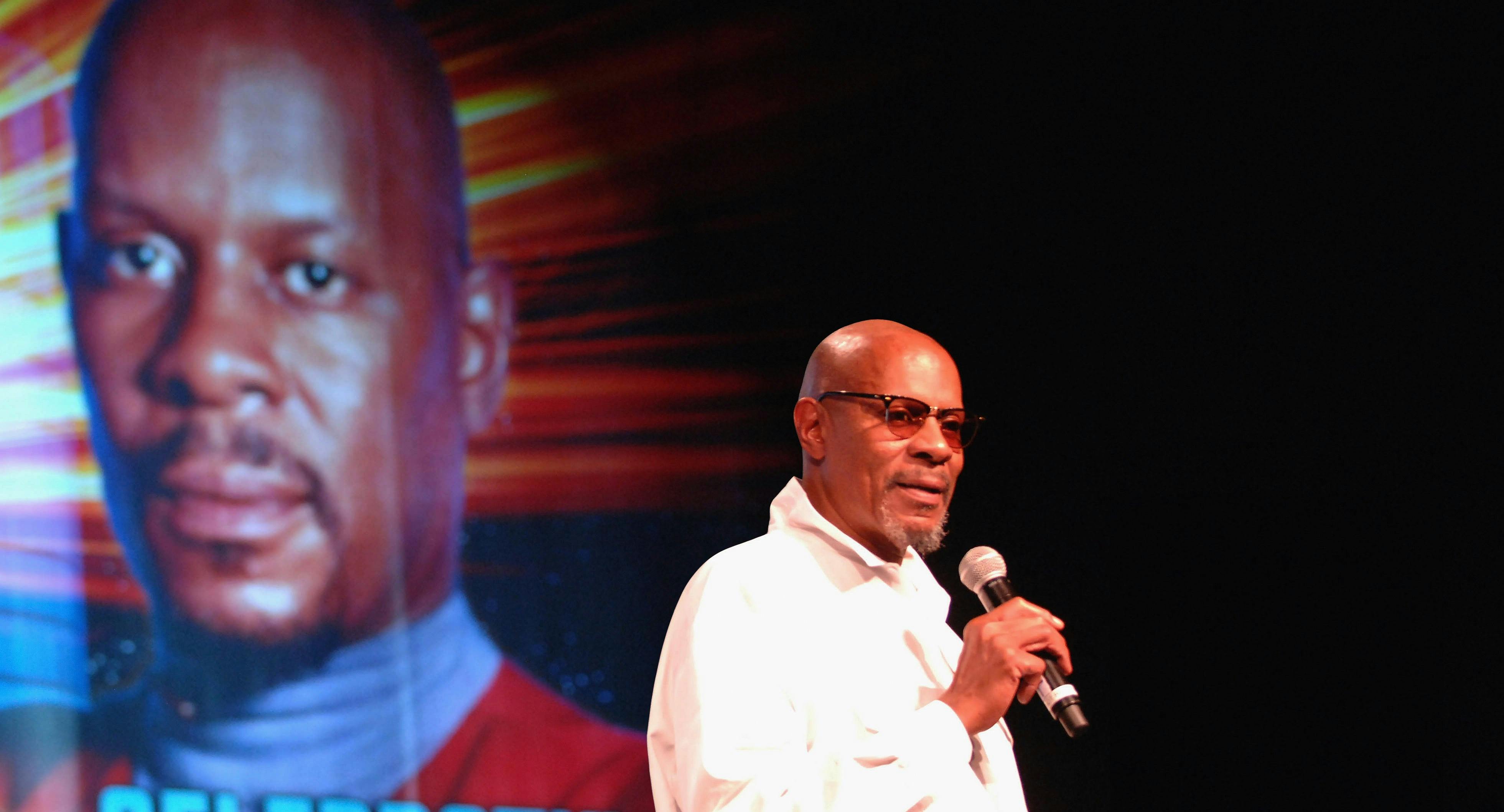
StarTrek.com
[This essay was originally published in 2012 on Racialicious.com. It has been reprinted with the permission of the original author.]
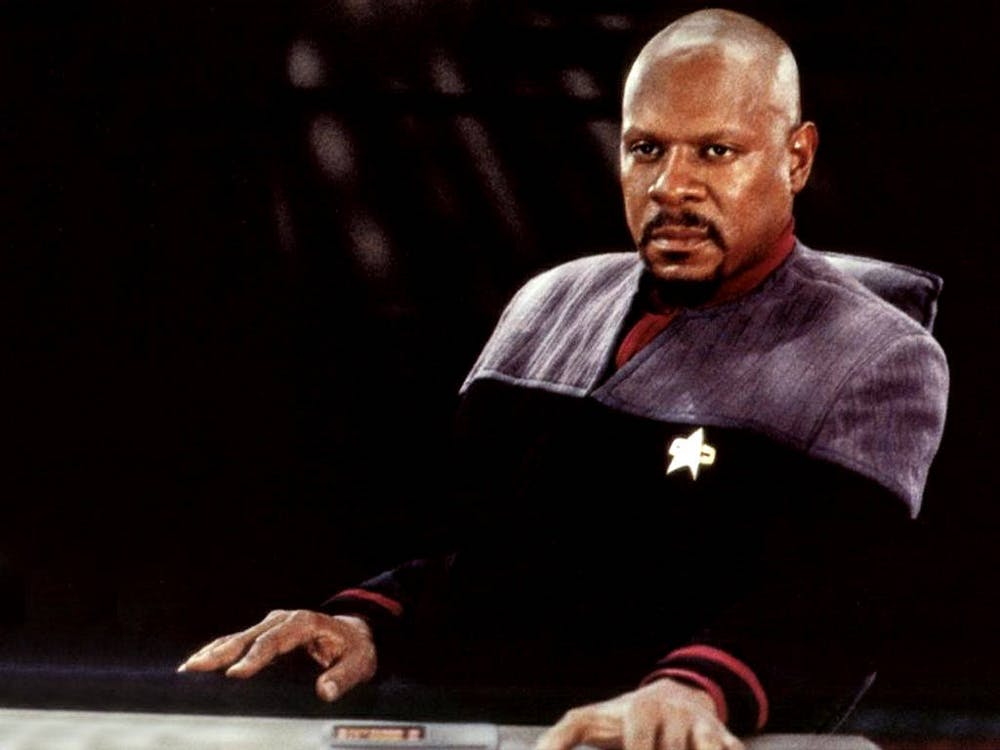
Sisko
"Star Trek: Deep Space Nine, is like The West Wing. But in space. With a Black president. Kind of."
That’s normally how I find myself trying to describe the show to the uninitiated, as I firmly believe that it’s the Trek series you have to use when trying to get people into Trek canon — especially Black nerds, before Discovery's rise. Deep Space Nine causes a strange division in the world of Trekkies. I’ve always found (non-scientifically?—?I just spend a lot of time at cons) that people either love it or loathe it. Meanwhile, I can’t wait to show it to my kids.
DS9 has your aliens and spaceships, and characters do occasionally say things like “set phasers to stun.” But all of that is more often than not outweighed through the gravitas brought to the show by the intricately laid political, wartime thriller plot, its critisisms of 20th century history and race relations in America, and its lead actor, Avery Brooks, who stars as Captain Benjamin Lafayette Sisko ?—? the first and only African-American captain to lead a televised Star Trek franchise.
The Star Trek franchise has always featured Black actors and actresses, well-developed Black characters, and even featured the first televised interracial kiss in the TOS episode "Plato’s Stepchildren." On Trek, racism is often dismissed on Earth as being as outdated as using money. Instead, racial politics between alien species are highlighted, rather than humans.
This model may have continued through DS9 had they hired any other actor to portray Captain Sisko. However, Brooks —? a Shakespearean-trained actor, graduate of Oberlin College, and the first Black student to earn an MFA in acting and directing from Rutgers University, where he was also a professor ?—? brought much of himself to the role, and that included an emphasis in the importance of the African-American and Black American experiences. Even nearly 300 years in the future, whether Star Trek fans were ready for it or not, DS9 brought the topic of race closer to home.
While I suspect the show's direct tone is one of the reasons DS9 isn’t as popular as its predecessors? —? along with the heavy emphasis on backroom politics instead of “seeking out bold new worlds”? —? if you didn’t like TNG chances are you’re going to love a show that goes out of its way in the pilot to distinguish Sisko from Captain Jean-Luc Picard. In the premiere, we learn Picard (while under control of the alien species The Borg) has killed Sisko’s wife.
In a meeting between the two, Sisko speaks to the TNG captain in a tone he’s likely never heard from a non-superior officer before, and Sisko’s dislike of the man ?— ?and the Deep Space 9 station itself? —? is made apparent. With that, Sisko distinguishes himself immediately as one of the few people with the mettle to speak openly to Picard. While the scene was likely included to make the segue from TGN to DS9 as smooth as possible with familiar faces, Picard does not exist to emerge the hero of the scene or to bring Sisko back into line, so to speak. Sisko is allowed his outrage, an incredibly rare thing for a Black man on television in the 1990s.
The meeting also introduces what would be one of the series’ most important subplots: Sisko is a family man in a way that neither Picard or Kirk ever were. He’s left a widower with an 11-year-old son, Jake Sisko (Cirroc Lofton), who is one of Sisko’s main motivations for not wanting the Deep Space 9 assignment. In William Shatner’s documentary The Captains, Brooks said it was important to him to portray a Black father on television that plays a positive role in his son’s life.
“I read the pilot, and said 'Well, this is very interesting to me,'” Brooks said. “A man dealing with loss, having to raise a child ?—? indeed, a male child?—? by himself, and be brown as we spin this tale in the 20th century about the 24th century.”
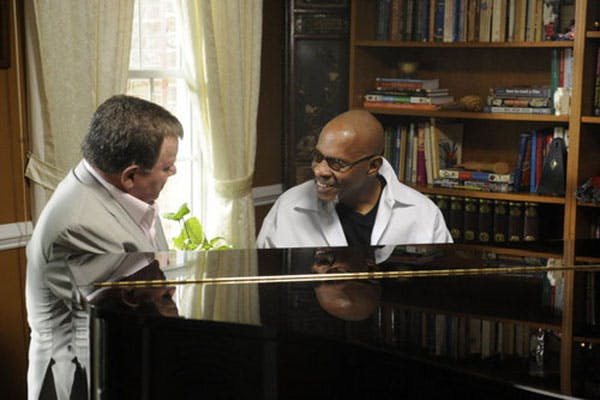
StarTrek.com
The depiction of the black father continued to be an important dynamic to Brooks through the show’s finale, when he initially thought writers were going to have Sisko abandon his son and unborn child. Upset by this decision he’s quoted as saying, “The producers told me, ‘Look we thought you’d be thrilled…The difference, of course, is you have Sisko with another child on the way. You still have Sisko with a young man [Jake Sisko] trying to find his way… That wasn’t fair.” [Shortened for Spoilers]. This view on ‘Parenting While Black’ is unique in the sci-fi fantasy genre. Often, Black parents tend to die off or abandon their children early in their lives, leaving unhappy, lonely and revenge-hungry children behind. Robin Wood (Buffy), Kendra Young (Buffy), Charles Gunn (Angel), Bonnie Bennett (TVD), and Walt Lloyd (Lost) come to mind immediately.
Even with an intergalactic war raging around them, Sisko was always there for Jake. They’re often shown having dinner together and Sisko is always eager to read over and help edit Jake’s stories and articles. He supports Jake’s decision to become a writer instead of going to the Starfleet Academy, even though that’s perhaps what he would have preferred. Episodes like "The Visitor" (guest starring Tony Todd as an older Jake Sisko) and In the Cards (where Jake tries to acquire a 1950s baseball card to cheer Sisko up during a stressful week) highlight the strength of the bond and loving relationship between father and son.
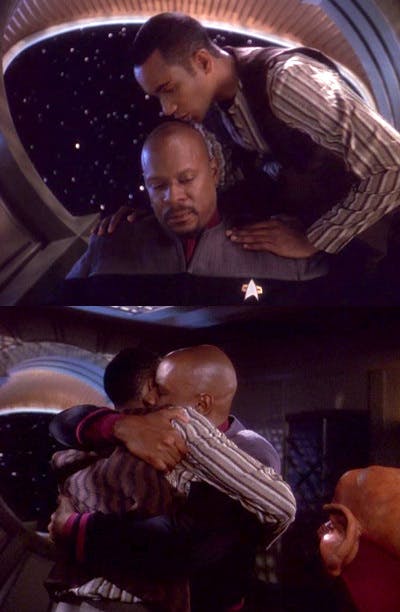
StarTrek.com
With a highly educated and vocal actor in the lead it’s no wonder you get get seven seasons of a series that takes the Black American experience to heart; Sisko’s character is specifically written to acknowledge the implications that the color of his skin bring. Not only do they write him an African-American girlfriend, Kassidy Yates, there are there are references to his New Orleans heritage, soul food, his love of baseball (particularly players Willie Mays and Jackie Robinson), and the various bits of African art we see decorating his quarters are all acknowledgements of his background throughout the show. But they never shy away from the cultural history of racism either. Sisko is still acutely aware of his past.
When his crew becomes infatuated with visiting “Vic’s,” a holosuite program set in a 1960s Las Vegas casino and lounge, Kasidy asks Sisko why he doesn’t want to join in on this Away Team Rat Pack Cosplay. His response is telling:
Sisko: You want to know … you really want to know what my problem is? I’ll tell you: Las Vegas 1962, that’s my problem. In 1962, black people weren’t very welcome there. Oh sure, they could be performers or janitors, but customers? Never.
Kasidy: Maybe that’s the way it was in the real Vegas, but that is not the way it is at Vic’s. I have never felt uncomfortable there, and neither has Jake.
Sisko: But don’t you see? That’s the lie. In 1962, the civil rights movement was still in its infancy. It wasn’t an easy time for our people, and I’m not going to pretend that it was.
Kasidy: Baby? — I know that Vic’s isn’t a totally accurate representation of the way things were, but… it isn’t meant to be. It shows us the way things could’ve been ?— ?the way they should’ve been.
Sisko: We cannot ignore the truth about the past.
Kasidy: Going to Vic’s isn’t going to make us forget who we are or where we came from. What it does is reminds us that we are no longer bound by any limitations ?—? except the ones we impose on ourselves.
It’s a small moment in a 45-minute episode, but the fact that it’s acknowledged is important. Sisko is initially displeased with his crew’s little Mad Men fantasy and he’s allowed to express it, no matter how uncomfortable it may make the viewer feel.
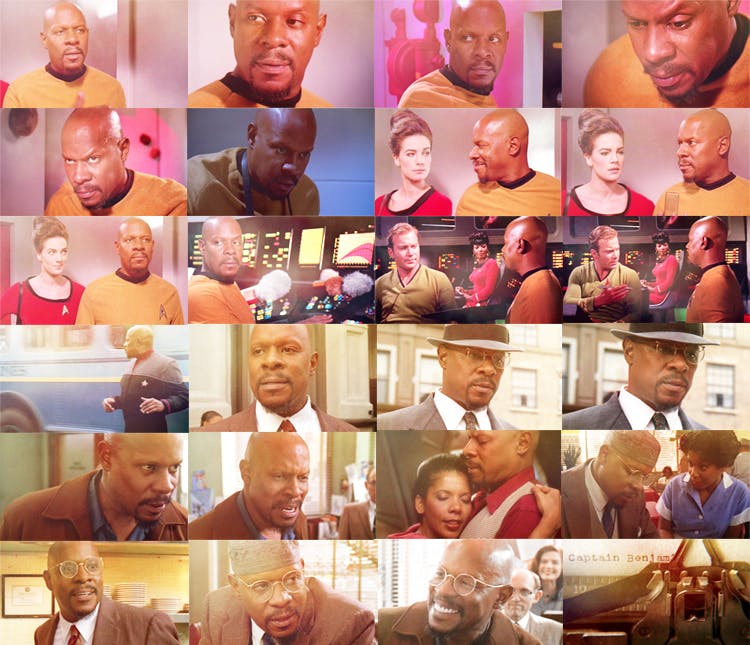
StarTrek.com
In season five, Avery Brooks would direct "Far Beyond The Stars," an episode that spends an entire 45 minutes dealing with race relations in mid-20th century America. The episode reimagines Sisko as a science-fiction writer named Benny Russell working for a racist and sexist New York magazine in the 1950s, where racism is present, but somehow subtler; it's more deceptive and innocent as it casually rolls off the tongues of people that Benny considers friends and colleagues. The magazine refuses to publish his stories about the character Benjamin Sisko, a Black starship captain.
When Benny’s editor finally does agree to publish his stories, he insists that the stories must be revealed to be the dreams (not the reality) of a poor Black man in their present time ?— ?because everyone knows the idea of a Black sci-fi hero is that unrealistic. With that, "Far Beyond the Stars" also reminds the viewer that despite the inclusive attitude the Trek franchise has embraced, science-fiction is still very much a white man’s world. For every single Octavia Butler there are five Joss Whedons. More pointedly, for every one Captain Sisko, there’s a Captain Picard, Captain Kirk, Han Solo, John Carter, and… well, you get the picture. With Sisko in the lead DS9 is self-aware and capable of criticizing the flaws of its own genre, and that’s something to appreciate.
I’m struck by how much more I understand this show at the age of 24, compared to when I rewatched it at 17, and before that when I originally watched from 1993 to 1999. I was only 11 when the finale aired (and grounded for a good deal of the season, but that’s another issue entirely) and while I vaguely understood the significance of Sisko, I admit to taking his presence ?—? the presence of a starring Black man ?— ?on my screen as normal. I like to think that Brooks would have appreciated that, knowing that part of his reasoning for accepting the role of Sisko was his belief that, “Brown children must be able to participate in contemporary mythology.”
In some ways the 1990s were a better landscape for a kid of color to get into science-fiction and fantasy. Not only did I have Sisko, there was Carl Lumbly as M.A.N.T.I.S, Wesley Snipes was Blade, Spawn aired on HBO and was made into a film, Cleopatra 2525 starring Gina Torres debuted in 2000, my favorite book series, Animorphs, starred Black and Latino teens, and Will Smith was king of the Summer sci-fi box office. When one looks at the scope of white genre heroes this isn’t a large number in comparison, but because Sisko was always there and when I felt the burden of whiteness in other genre media, I could always come home to DS9.
My First Contact: Kendra James
Kendra James is the Managing Editor of StarTrek.com. Follow her on Twitter @KendraJames_.

